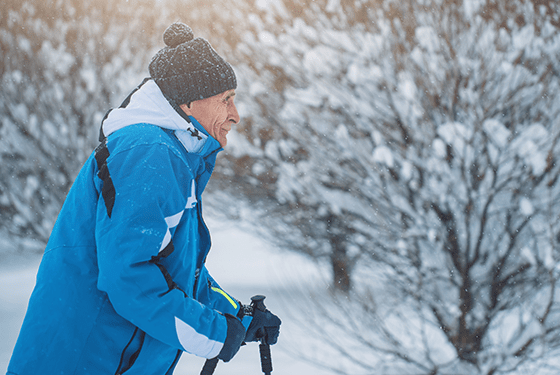Depending on where you live, the weather outside can get pretty frightful during the winter months. Plunging temperatures, snow and ice can pose problems both indoors and out. This can put older adults at a higher risk for injuries and other weather-related health issues. You can minimize cold-weather dangers simply by being prepared with safety tips for winter seasons. All it takes is a little planning and attention to your surroundings. Following are some winter safety tips for seniors—and their caregivers.
How To Minimize Risk With Winter Safety Tips For Seniors
Freezing temps bring snow and icy walkways, which can be extremely dangerous for elderly friends and family members. It’s important to be extra careful outdoors this time of year. Here are a few safety tips for winter season fall prevention:
Attraction to traction.
Make sure footwear is suitable for winter weather. Check the traction and fit. Consider anti-slip overshoes or use non-slip treads on your existing shoes. Lined boots with good traction will also keep you safe and warm.
The salt of the Earth.
It’s important to keep salt on hand so you can sprinkle it on walkways without having to risk a fall outside. Make sure the sidewalk, driveway, front walk and front steps are salted.
Get your grip!
Take advantage of railings and loved one’s arms when offered. This will keep you more stable as you make your way up and down stairs.
Take your time.
Hurrying when leaving your home, getting on and off the bus, crossing the street or unloading your car can put you at risk of falling. Take your time and pay attention to steps, curbs, ramps and patches of ice.
Strengthen your legs.
Exercise is one of the most important things you can do for fall prevention. Simple moves done in the home, even from a sitting position, will help build muscle and keep you steadier so you don’t lose your balance.
Most Common Causes of Injury For Seniors in Winter
While cold weather mishaps are not entirely avoidable, knowing what can cause injuries before they happen and winter safety tips to prevent them is half the battle. Below are more winter safety tips for seniors to help prevent injury:
Falling
Seniors are more prone to injury from a slip or fall. In fact, the CDC reports that falls are the leading cause of injury for adults ages 65 and older. Snow and ice can compound the problem, making even a simple walk to the mailbox treacherous. The best protection is to stay indoors when sidewalks and roads are covered in winter white.
Shoveling
Shoveling snow is a job everyone loves to hate. And for older adults, it may be a job best left to someone else. Data from the Cleveland Clinic shows that shoveling snow sends more than 11,000 people to the hospital each year. For many, shoveling can cause orthopedic injury. For others, it can trigger a heart attack. Don’t hesitate to ask for help. If you must shovel, work in short shifts, don’t overload the shovel and dress in warm layers to protect yourself from the elements.
Hypothermia and frostbite
Frigid temperatures can be more than unbearable—they can be downright dangerous. If you’re going to be outside for an extended period of time, you need to be dressed for the weather—heavy coat, hat, gloves, scarf, warm socks and boots. Without the proper attire, you risk frostbite on exposed skin and an unsafe drop in body temperature, known as hypothermia, which can result in death. Older adults are at a higher risk of hypothermia due to changes that happen as your body ages. Your best bet is to keep the inside temperature of your home at 65 degrees or warmer and limit outside exposure to short trips.
Driving
Have your vehicle serviced and winterized so it’s ready for less-than-optimal driving conditions. Be sure to check the oil, antifreeze, tires, battery and wipers. Assemble an emergency kit to keep in your trunk with a few basic supplies: blankets, jumper cables, windshield scraper, small shovel, rock salt or cat litter (for tire traction if you get stuck), water and non-perishable food, flashlight and first aid kit. If you must drive in winter weather, be especially careful on overpasses, bridges and ramps, which tend to freeze before roads. Consider taking an alternate route to avoid roads that aren’t well-traveled or cleared. Always take your cell phone so you can reach out for help in case of an emergency.
Home Heating
The best place to be on a cold, snowy day is in the warm comfort of your own home. Older adults come from a generation that’s familiar with and often prefers the use of alternate heat sources, such as fireplaces, gas heaters and wood stoves. But these sources can be hazardous if not safely managed. Before you fire up your heating devices for the season, make sure they’re properly maintained, cleaned and vented. If not, you run the risk of exposure to carbon monoxide. Make sure you have smoke and carbon monoxide detectors in your home and frequently test the batteries. If you’re using a space heater, be sure to keep it at least three feet away from anything that can burn (curtains, rugs, bedding, etc.).
FirstLight Home Care – Senior Home Care Services
The best winter safety tips for seniors are to be aware of cold-weather risks and ask for help when needed. Whether it’s assistance with snow removal, a ride to the grocery store or doctor’s appointment, or help arranging a service technician for your car or home heating device, you don’t have to tackle these tasks on your own. FirstLight can help. With awareness, pre-planning and winter safety tips, you can safely maintain independence at home, no matter what challenges Old Man Winter throws your way.
